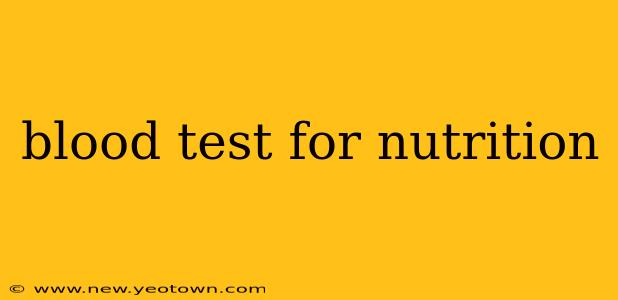Have you ever wondered if your diet truly aligns with your body's needs? Feeling sluggish, experiencing unexplained symptoms, or simply aiming for optimal health? A nutritional blood test might be the key to unlocking a deeper understanding of your body's nutritional landscape. This isn't just about identifying deficiencies; it's about gaining actionable insights to fuel your body for peak performance and well-being. Let's delve into the fascinating world of nutritional blood tests.
What is a Nutritional Blood Test?
Imagine your blood as a miniature mirror reflecting your internal health. A nutritional blood test analyzes various components within your blood to reveal insights into your nutritional status. It goes beyond simply checking for obvious deficiencies; it provides a detailed picture of your body's absorption and utilization of essential vitamins, minerals, and other nutrients. This comprehensive assessment can highlight potential imbalances before they escalate into significant health problems.
What Nutrients Can a Blood Test Reveal?
This isn't a one-size-fits-all scenario. The specific nutrients analyzed can vary depending on the individual's needs and the chosen test. However, many comprehensive tests evaluate a broad range of essential nutrients, including:
- Vitamin D: Crucial for bone health, immune function, and mood regulation. Low levels are incredibly common.
- Vitamin B12: Essential for nerve function, red blood cell production, and DNA synthesis. Often deficient in vegetarians and vegans.
- Iron: Vital for carrying oxygen throughout the body. Deficiency can lead to anemia.
- Folate: Critical for cell growth and development, particularly during pregnancy.
- Other B Vitamins: Each B vitamin plays a unique role in metabolism and energy production.
- Minerals: Such as zinc, magnesium, and selenium, which are involved in numerous bodily functions.
What are the Benefits of a Nutritional Blood Test?
The benefits extend far beyond simply identifying deficiencies. A nutritional blood test can:
- Personalize your diet: Tailor your nutritional intake based on your specific needs, maximizing the effectiveness of your dietary choices.
- Prevent health problems: Identify potential deficiencies before they lead to more serious health issues.
- Improve athletic performance: Optimize nutrient intake for enhanced energy levels, muscle recovery, and overall athletic performance.
- Boost energy levels: Address underlying nutritional imbalances that may be contributing to fatigue and low energy.
- Enhance overall well-being: By addressing nutritional imbalances, you may experience improvements in mood, sleep, and cognitive function.
What Types of Nutritional Blood Tests are Available?
The market offers a variety of tests, catering to different needs and budgets. Some focus on specific nutrients, while others provide a broader profile. It's crucial to consult with a healthcare professional or registered dietitian to determine the most appropriate test for your individual circumstances.
How to Prepare for a Nutritional Blood Test?
Preparation varies depending on the specific test. However, some general guidelines include:
- Fasting: Some tests require fasting for a specific period before blood collection. Your healthcare provider will provide detailed instructions.
- Medication disclosure: Inform your healthcare provider about any medications you are currently taking, as they may influence test results.
- Hydration: Stay properly hydrated before your appointment.
Can a Blood Test Detect Food Sensitivities or Allergies?
While a standard nutritional blood test doesn't directly identify food sensitivities or allergies, it can provide clues. For example, elevated inflammatory markers might suggest a reaction to certain foods. Specific allergy testing is usually required for a definitive diagnosis of food allergies.
How Accurate are Nutritional Blood Tests?
The accuracy of nutritional blood tests depends on various factors, including the quality of the laboratory, the testing method, and individual variations. It's essential to choose a reputable laboratory and discuss the results with a qualified healthcare professional for proper interpretation.
What Do I Do After Receiving My Nutritional Blood Test Results?
Once you receive your results, it's vital to discuss them with a healthcare professional or registered dietitian. They can help you interpret the findings, develop a personalized plan to address any deficiencies or imbalances, and monitor your progress. Remember, the results are a starting point, not a destination.
By understanding the power of nutritional blood testing, you embark on a journey towards a deeper understanding of your body's unique nutritional needs. It's a powerful tool for proactive health management, empowering you to take charge of your well-being and achieve optimal health. Remember to consult a healthcare professional for personalized guidance and interpretation of your results.

